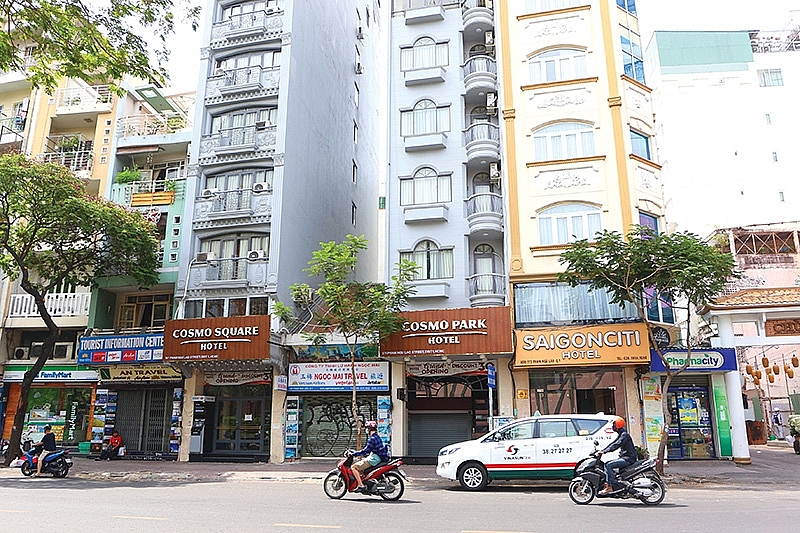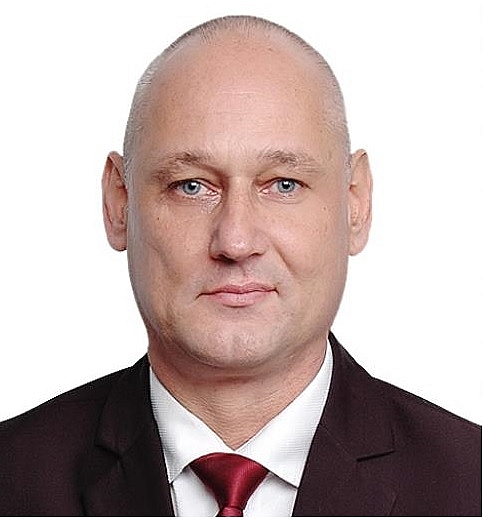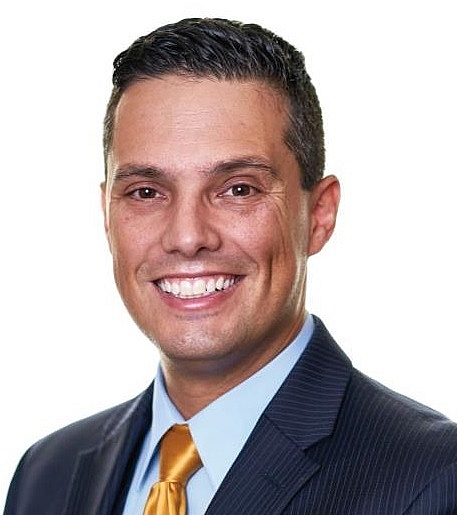The prolonged coronavirus emergency has pushed hotel owners to sell off their distressed assets, while having to deal with drops of up to 30 per cent of hotel valuations in the Vietnamese hospitality market.

Many hotel owners are having to weigh up selling off or trying to continue in business, Photo: Le Toan
Hotels across the country have had to shut down permanently during the COVID-19 crisis due to lack of revenue, with many being offered up to new owners. According to Sohovietnam, an agency specialising in mergers and acquisitions (M&A) in the hospitality sector, the demand for such deals has been increasing recently, with interest coming from many domestic and foreign investment funds, as well as capable financial investors.
Sohovietnam president Phan Xuan Can told VIR that at present, the company has a portfolio of dozens of mini hotels, more than 12 mid-sized hotels, and eight high-end hotels which are being offered to buyers. Of those, two high-end hotels are attracting great interest from overseas buyers.
“By my estimation, a sum of VND8-10 trillion ($347-434 million) is ready to be invested in completed or under-construction hotels and resorts in key tourism destinations such as Hanoi, Ho Chi Minh City, Danang, Nha Trang, Phu Quoc, Hoi An, and more,” Can said.
The most favoured hotels by buyers are typically 4-star with upwards of 100 rooms, with investment capital ranging around VND400-500 billion ($17-21 million) each.
Can said if the pandemic is prolonged and the social distancing measures are tightened, it is likely that many hotels will find it difficult to tread above water.
Among those, smaller hotels are most likely to be acquired because their owners have been forced to sell them as distressed assets due to being unable to burden heavy losses. However, the difficulty endured by these investors is an opportunity for others.
Talking about which cases are most likely to sell their assets at this time, Can pointed to investors who had rented some hotels, or even a chain of 10-15 small- and medium-sized hotels in city centres to do business. These investors are now facing a lack of cash flow because of the shutdown order.
Second are those investors who had bought out a whole hotel but had to take up loans and now have to sell off their hotels to pay the debt.
Investors who are owners of hotels but are under no financial pressure would rather close hotels, cut costs, and wait for the pandemic to pass. Those investors would be last on the list of those being forced to sell.
The pandemic has been offering opportunities for both buyers and sellers, with prices dropping towards the real evaluation of assets value. However, the actual price in the context of the crisis that these investors accept to pay is falling through the roof, by 20-30 per cent compared to the prices fixed before the pandemic came into view.
In financial analysis, hotel performance data is often assessed by investors through the earnings before interest, taxes, depreciation, and amortisation (EBITDA).
In the past, when tourism was at its peak, hotels doing very well with high occupancy and revenue were paid around 11- or 12-fold of their EBITDA in hotel M&A deals. Those prices are currently offered at about 8-fold of EBITDA only.
Buyers are now aiming at hotels with owners facing financial difficulties, including those who have loans from banks or institutional organisations and have to pay due debts.
Along with looking at EBITDA, buyers also consider many other factors such as the location and the quality of human resources available at the targeted hotels.
One type of hotel owner targeted by buyers more often than not are those who have invested in a hotel as an extra business only. During difficult times such as these, they must centralise all of their capital sources back to their core business, and then must consider selling off hotels.
Foreign investors are now most interested in high-end hotels in the central business districts of Hanoi and Ho Chi Minh City where they can utilise meeting, incentive, conference, and exhibition services, when resorts are preferred in coastal areas of the country.
“This is a time for real demand from both buyers and sellers, therefore, I would not doubt that successful deals could be seen in the coming time,” Can of Sohovietnam said.
According to JLL Vietnam, both international and domestic investors are showing a difference in tastes. While foreign investors are actively seeking opportunities with higher returns in Vietnam via operating hotel assets with in-place cash flow, the majority of domestic equivalents are interested in developing hotels and resorts from vacant land banks.
Vietnam has become an alluring destination for many financiers, largely due to the country’s friendly policies encouraging foreign direct investment, along with its political stability and strong economy. As a result, Vietnam remains one of the most favoured destinations for foreign investment in the region.
Kai Marcus Schroter - CEO, Hospitality Tourism Management  The pandemic will have far-reaching economic consequences and the airline, tourism, and hospitality industry are the first to feel the pain. Widespread travel restrictions and entire countries under lockdown resulted in unbearably low occupancy and losses for hotels. Nobody could have foreseen this. However, I think that it is also good business sense to be prepared for any eventuality, building up reserves in good times, and having contingency plans in place. I see many developers in Vietnam building hotels without much planning, expecting a quick return on their investment. Many such owners are now surprised, forced to close or even dispose of their assets to maintain cash flow and honour their commitments. Most owners are also not covered with business interruption insurance. Such a way of doing business is in my view just not sustainable, and we often try to warn owners. The hotel business can be highly rewarding, but it is and remains a relative risky business, vulnerable to exterior factors and changes. I remind people that we have gone through a series of similar health crises, albeit not so bad as this one. As the saying goes, failing to prepare is preparing to fail. It will be difficult in this climate for owners to dispose of hotel assets and achieve a good price. At the same time, I would warn potential buyers against snapping up hotel properties because of the cheap price alone. There is a lot more to acquiring and managing hotel assets and price should not be the only factor. Dr. Nuno F. Ribeiro - RMIT Vietnam Ho Chi Minh City  Tourism has a multiplier effect in several sectors in the economy, and one of those sectors is real estate, as the Vietnam Real Estate Association pointed out last year. While the loss of tourism revenue is not ideal, having individuals with the vision and the cash-flow to invest in the future of tourism in Vietnam is very positive. One of the reasons this is happening is due to the government’s efforts, most notably the passing of Resolution No.08-NQ/TW which identified tourism as a spearhead industry in Vietnam. From the point of view of the investors, when considering to buy an asset, buyers certainly will be looking at return on investment, which in this case will be tied to how quickly tourism will recover, market share, location, transportation, and the availability of qualified human resources to manage these hotels. Potential investors may also want to consider the potential for multi-use, such as residential and commercial use in areas adjacent to the hotel. Buyers and sellers should also consider a long-term view of tourism development in Vietnam. Buying a hotel is a long-term investment, and investors should not expect to recover their investment excessively quickly. Similarly, sellers may feel pressured to sell without considering that tourism demand is likely to rebound in Vietnam faster than in other destinations. Buyers and sellers should follow government regulations, conduct business in good faith, and do what is best for Vietnamese tourism. Ultimately, we all want sustainable tourism in Vietnam that benefits everyone. Thuc Nguyen - Associate director CBRE Hotels Vietnam  The pandemic is considered a “black swan” event – a rare, unexpected occurrence with massive consequences to both the economy and society. With regards to Vietnam’s hotel market, this will be a refining period to select the capable investors/developers, helping the market to rebound stronger once the pandemic is over. Property valuation during this time will face many challenges. As the disease may have unexpected twists and turns, it will be difficult to forecast the property’s performance in the short and medium term, such as predicting when the market will start to recover, and how long it will take to return to pre-pandemic levels. Since the impact of this pandemic is unprecedented and market evidence for comparison purposes is limited, in times of market volatilities like this most forecasting models should only be relied on with a certain level of caution. With the expectation of prices declining, some buyers may be seeking too big a bargain, making it difficult for both sides to reach a consensus. Besides prices and yields, for hotel M&A transactions, legal status, location, accessibility, and scale of the property are also important factors. For instance, some big foreign funds may only be interested in gateway cities like Hanoi or Ho Chi Minh City, and often require a minimum number of keys. In addition, the remaining life of the property and the flexibility to change the hotel’s operator, as well as the future competitive landscape, are also factors often considered carefully. |